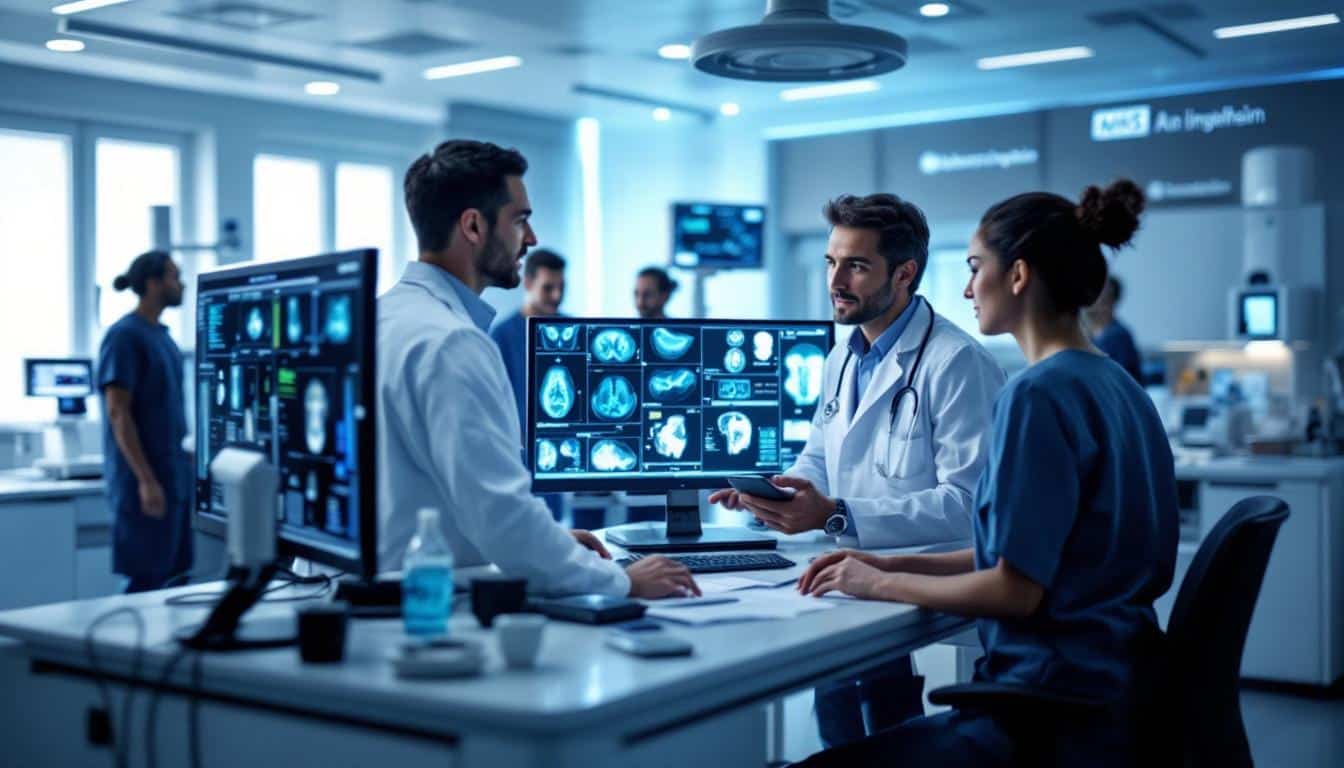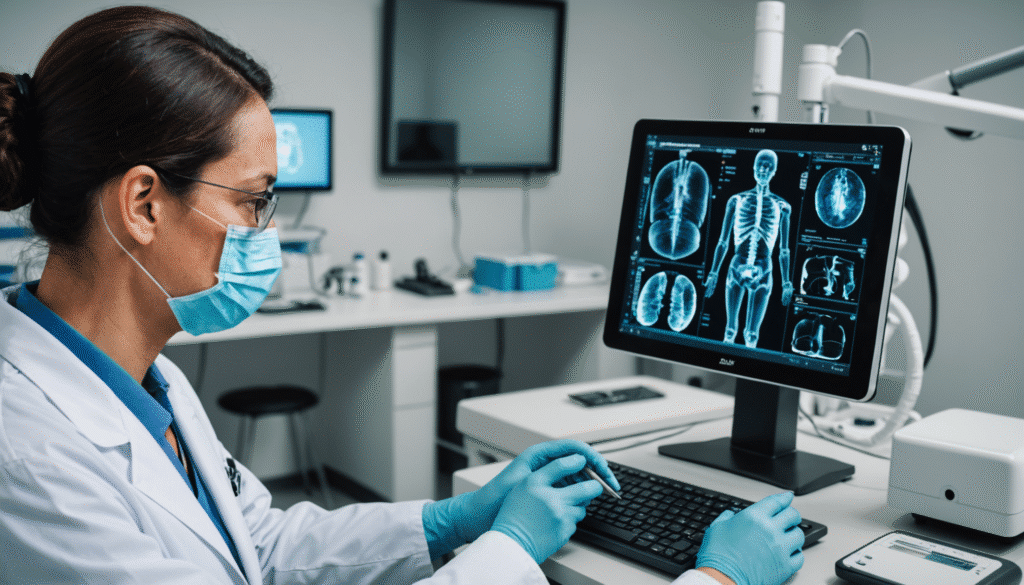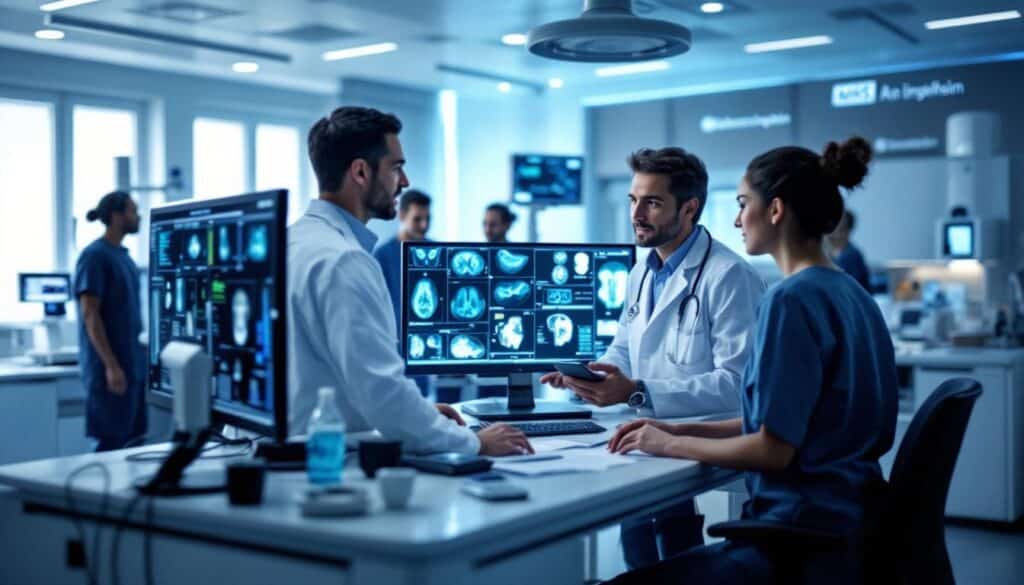“`html
Welcome to our weekly recap on health technology. Every week, we explore the latest innovations and trends shaping the industry. Stay informed about crucial advancements for your practice and research.
In this edition, discover how artificial intelligence is revolutionizing administrative tasks in healthcare, speeding up data-driven outcomes, and improving provider privilege management. Dive into discussions on AI-assisted drug discovery and new regulations in California. Learn how interoperability fosters more compassionate care and the ongoing challenges in cybersecurity. Additionally, explore funding opportunities and merger-acquisition activities that are energizing the sector. Don’t miss our tips for securing virtual appointments and transforming telemedicine through innovative solutions. Finally, stay updated with available job offers to strengthen your teams and projects.
Opportunities for AI agents in the healthcare sector. Jason Warrelmann from UiPath, Harsh Singh and Vinit Singhal from Genzeon discussed with John Lynn the possibility of automating 60% of tasks in healthcare organizations. Read more…
Accelerating data-driven outcomes in hospitals. Colin Hung talked with Nora Lissy and James Kirtley from Dimensional Insight about the importance of making data accessible and reliable for the entire organization. Read more…
Provider privilege management. Scott Turkow and Alden Mitchell from Medallion spoke with Brittany Quemby about ways to save time during the certification process through the automation of data collection and administrative processes. Read more…
Life Sciences Today Podcast: Drug discovery with AI and advanced technologies. Danny Liberman spoke with Matti Gill from AION Labs about how small focused teams can shape the future of medicine. Read more…
CIO Podcast: Laws and regulations in California. David T. Ford from the California Medical Association discussed with John the Golden State’s efforts to regulate AI use and segment certain types of EHR data. Will other states or the federal government follow? Read more…
Role of interoperability in supporting compassionate care. Ladd Wiley from Epic and Dr. Michael Burns from Michigan Medicine described how automated data exchange between state governments and healthcare organizations helps families cope with the loss of a loved one. Read more…
Limitations of HIPAA audits and necessary changes. Jay Trinckes from Thoropass noted that OCR generally only evaluates eight of the 180 HIPAA provisions during audits, leaving IT teams responsible for filling compliance gaps. Read more…
Why the healthcare ecosystem needs comprehensive cybersecurity. Andrew Mahler from Clearwater emphasized that every healthcare player must adopt HIPAA-compliant risk analyses and NIST cybersecurity frameworks, with a particular focus on vendor oversight and device security. Read more…
How to secure virtual appointments. Telemedicine is vulnerable to cybersecurity threats like inadequate authentication and unencrypted communication. John Funk from SevenAtoms presented key steps to enhance the security of virtual care. Read more…
Transforming healthcare with AI and device-free remote monitoring. Darren Challender from Hitachi Digital Services recapped a webinar showcasing how aggregating smartphone data makes remote monitoring more accessible and improves care management. Read more…
Healthcare IT jobs for the week of April 9, 2025. Many positions in health information management and clinical quality are available. Read more…
Bonus functions from April 6, 2025. 81% of patients with chronic illnesses want the pharmaceutical industry to help them obtain care and medications, and 63% of patient bills exceed initial estimates. Read more…
Funding and merger-acquisition activity
- Knack RCM acquired PPM Partners, specializing in anesthesia billing and practice management.
- The musculoskeletal care provider Vori Health raised $53 million in Series B funding.
- Freed, an AI clinical assistant, raised $30 million in Series A.
- The patient data platform for labs and wearables Junction raised $18 million in Series A.
Thank you for reading, and don’t forget to check out our latest weekly recaps on Healthcare IT Today.

Welcome to our weekly summary dedicated to the latest innovations and news in the field of health technology. This week, we explore fascinating advances in artificial intelligence, cybersecurity, and much more. Let’s dive into the details of the topics shaping the future of health.
what opportunities does artificial intelligence offer to healthcare agents?
Artificial intelligence continues to revolutionize the healthcare sector. This week, Jason Warrelmann from UiPath, along with Harsh Singh and Vinit Singhal from Genzeon, joined John Lynn to discuss the opportunities that AI offers to healthcare organizations. According to their discussions, up to 60% of tasks performed in hospitals have automation potential. These tasks include managing patient records, scheduling appointments, and processing medical data.
Automation not only reduces administrative workload but also improves efficiency and accuracy in care. For example, using AI agents to monitor vital signs in real-time can help quickly detect anomalies and prevent serious complications. Additionally, AI facilitates the personalization of treatments by analyzing vast datasets to identify the most effective therapies for each patient.
These advances show that AI is not just a technological tool but a true partner in healthcare delivery. To learn more about innovative AI initiatives in health, check out our detailed recap.
how are hospitals accelerating data-driven outcomes?
Access to and reliability of data are essential for obtaining data-driven outcomes in hospitals. This week, Colin Hung chatted with Nora Lissy and James Kirtley from Dimensional Insight about the importance of making data accessible and useful for the entire organization.
By integrating advanced data management systems, hospitals can quickly analyze trends and make informed decisions. For example, predictive analytics can help anticipate spikes in intensive care demand, allowing for better resource allocation. Additionally, data visualization facilitates communication between different departments, ensuring optimal care coordination.
Hospitals that adopt a data-driven approach see significant improvements in care quality and operational efficiency. For an in-depth analysis of these practices, check out our weekly summary.
what are the challenges of managing provider privileges?
Managing provider privileges is crucial to ensuring quality and safety of care. Scott Turkow and Alden Mitchell from Medallion discussed with Brittany Quemby ways to save time during the due diligence and follow-up processes through automation. By automating data entry and administrative processes, hospitals can reduce human errors and speed up the verification of provider qualifications.
An effective privilege management system ensures that only qualified professionals can access sensitive information and critical resources. This enhances compliance with regulations such as HIPAA and improves patient trust in the healthcare system. Additionally, automation facilitates regular updates of provider records, ensuring all information is current and accessible in real-time.
To discover how Medallion is transforming provider privilege management, check out our innovation detail.
how is AI revolutionizing drug discovery?
Drug discovery greatly benefits from advances in artificial intelligence and deep technology. Danny Liberman met with Matti Gill from AION Labs to discuss how small specialized teams are driving the future of medicine.
AI allows for rapid analysis of vast biological and chemical datasets to identify new therapeutic compounds. By modeling molecular interactions, researchers can predict the efficacy and safety of potential drugs even before clinical trials commence. This not only reduces the time needed to develop new treatments but also decreases the costs associated with research and development.
Moreover, AI facilitates the personalization of treatments by enabling the development of targeted therapies that specifically address individual patient needs. This approach increases treatment success rates and minimizes undesirable side effects.
For a deeper exploration of drug discovery with AI, listen to our dedicated podcast.
what are the new California regulations on AI in healthcare?
California is at the forefront of regulatory efforts surrounding artificial intelligence in healthcare. David T. Ford from the California Medical Association discussed with John Lynn about the state’s initiatives to regulate AI use and segment certain types of Electronic Health Records (EHR) data.
The new regulations aim to ensure that AI is used ethically and securely, thus protecting patient privacy. They impose strict standards regarding algorithm transparency and the accountability of decisions made by AI systems. Additionally, these regulations seek to prevent algorithmic biases that could negatively impact certain patient groups.
The potential impact of these regulations is significant, as they could serve as a model for other states and even for federal legislation. By taking a proactive approach, California ensures that technological innovation unfolds with respect for patients’ rights and safety.
For a comprehensive analysis of California regulations, check our detailed summary.
how does interoperability support compassionate care?
Interoperability of health systems plays a crucial role in supporting compassionate care. Ladd Wiley from Epic and Dr. Michael Burns from Michigan Medicine described how automated data exchange between state governments and healthcare organizations helps families cope with the loss of a loved one.
With better interoperability, necessary medical information can be shared quickly and securely among different entities. This allows for more effective coordination of care, thereby reducing stress and administrative burden for grieving families. For example, data may be used to organize support services, schedule follow-up visits, and provide personalized resources for survivors.
Moreover, interoperability facilitates a quicker response during public health crises, allowing hospitals and emergency services to collaborate seamlessly to meet patients’ urgent needs.
To learn more about the role of interoperability in compassionate care, check our detailed report.
what are the limitations of HIPAA audits and what reforms are necessary?
HIPAA audits have certain limitations that need reform. Jay Trinckes from Thoropass highlighted that the Office for Civil Rights (OCR) typically evaluates only eight of the 180 HIPAA provisions during audits. This approach leaves many compliance aspects unexamined, placing the responsibility on IT teams to fill the gaps.
To improve the efficiency of HIPAA audits, it is crucial to expand the scope of checks to include more provisions. This would allow for a more comprehensive assessment of healthcare organizations’ compliance and ensure more robust protection of patient data. Additionally, audits should be accompanied by clear guidelines and additional resources to help IT teams identify and rectify vulnerabilities.
Increasing the frequency and depth of audits would also encourage a culture of ongoing compliance, where organizations are incentivized to maintain high standards for data security. This would reduce the risks of data breaches and strengthen patient trust in the healthcare system.
For more details on the current limitations of HIPAA audits and necessary reforms, consult our in-depth analysis.
why does the healthcare ecosystem need comprehensive cybersecurity?
Cybersecurity has become an absolute priority in the healthcare ecosystem. Andrew Mahler from Clearwater stressed that all healthcare actors must adopt HIPAA-compliant risk analyses and NIST cybersecurity frameworks. Vendor oversight and device security are also essential to protect sensitive patient data.
With the increase in cyberattacks targeting healthcare systems, it is imperative that every entity, be it hospitals, providers, or medical device developers, establish robust security measures. This includes utilizing advanced firewalls, intrusion detection systems, and data encryption protocols. Additionally, regular employee training on cybersecurity practices is crucial to reduce the risk of human error.
Implementing cybersecurity frameworks such as those from NIST allows for the standardization of security practices and ensures consistent protection across the healthcare ecosystem. Furthermore, continuous monitoring and prompt incident response can minimize the impacts of attacks and restore patient trust in healthcare organizations’ ability to protect their information.
For a comprehensive exploration of cybersecurity practices in healthcare, consult our detailed guide.
how to ensure the security of virtual appointments in telemedicine?
Telemedicine offers increased flexibility for patients and healthcare professionals, but it also carries cybersecurity risks. John Funk from SevenAtoms presented the main steps to improve the security of virtual consultations.
Common threats include insufficient authentication, social engineering, and unencrypted communications. To counter these risks, it is recommended to use multi-factor authentication systems, educate users on social engineering techniques, and ensure that all communications are end-to-end encrypted.
Additionally, using telemedicine platforms that comply with security standards and HIPAA regulations is essential. These platforms integrate features such as role-based access control, activity logging, and data backup mechanisms to ensure patient information confidentiality and integrity.
By adopting a proactive approach to cybersecurity, telemedicine providers can offer secure and reliable services, thereby strengthening patient trust and facilitating the widespread adoption of telemedicine.
For further advice on securing virtual appointments, check our practical guide.
how are AI and device-free RPM transforming healthcare?
The integration of artificial intelligence with RPM (Remote Patient Monitoring) without physical devices opens new possibilities for care management. Darren Challender from Hitachi Digital Services recapped a webinar highlighting how aggregating data from smartphones makes remote monitoring more accessible and improves care management.
The use of smartphones and mobile applications allows for the collection of essential health data such as heart rate, blood pressure, and physical activity levels without requiring bulky medical devices. AI analyzes this data in real-time to detect anomalies and prevent complications, enabling quick and effective interventions.
This approach also facilitates patient engagement in their own health by providing tools to track their progress and receive personalized recommendations. Additionally, it reduces costs associated with purchasing and maintaining medical devices, making healthcare more accessible to a larger number of people.
To learn more about the transformation of care through AI and device-free RPM, check our complete summary.
what are the latest job offers in the health IT field?
This week, many job opportunities have emerged in the area of health information management and clinical quality. Whether you are an experienced professional or a recent graduate, the health IT sector offers a variety of positions suited to different skill levels.
Currently in demand are roles for health data analysts, IT project managers, cybersecurity specialists, and health software developers. These positions require a deep understanding of health systems, advanced technical skills, and the ability to collaborate with various stakeholders to improve processes and care quality.
The healthcare sector is undergoing a digital transformation, which is driving increased demand for professionals capable of navigating this constantly evolving environment. Candidates with skills in data analysis, information systems management, and data security are particularly sought after.
To check out the latest job offers and find the position that fits your skills and aspirations best, visit our careers section.
what is the impact of funding and M&A activity in health IT?
The health IT sector is experiencing increased activity in funding and mergers and acquisitions. This week, Knack RCM acquired PPM Partners, a company specializing in anesthesia billing and practice management. This acquisition strengthens Knack RCM’s market position by expanding its services and enhancing its overall offering.
Additionally, the musculoskeletal care provider Vori Health secured $53 million in Series B funding, demonstrating investors’ confidence in its innovative care delivery model. Freed, an AI-based clinical assistant, raised $30 million in Series A, while Junction, a patient data platform for labs and wearables, obtained $18 million in Series A.
These investments reflect a growing trend toward adopting advanced technologies to improve care efficiency and health data management. The raised funds will be used to accelerate product development, expand operations, and strengthen the technological capabilities of the companies involved.
For more details on the latest funding and merger and acquisition activities in health IT, check our dedicated section.
bonus: interesting statistics and trends to watch
Furthermore, our bonus this week includes revealing statistics: 81% of patients with chronic illnesses want pharmaceutical companies to help them obtain care and medications, and 63% of patients find their medical bills to be higher than initial estimates. These figures highlight the importance of increased transparency and improved support in patients’ care journeys.
These trends illuminate the need for healthcare professionals and organizations to focus on enhancing patient experiences and managing costs. By adopting innovative technological solutions and strengthening communication with patients, the healthcare sector can more effectively respond to these challenges.
Continue your reading with our trends section to stay informed about key developments in the health IT field.
This week has highlighted significant advances in medical technology and artificial intelligence. Discussions around AI agents in healthcare revealed immense potential to automate up to 60% of tasks, allowing professionals to focus on more critical aspects of patient care.
Furthermore, the importance of making data accessible and reliable has been emphasized, with initiatives aimed at accelerating data-oriented outcomes in hospitals. The automation of administrative processes, such as managing provider privileges, has also been a focal point, demonstrating how technology can optimize operational efficiency.
The Life Sciences Today podcast delved into the role of AI and advanced technologies in drug discovery, highlighting the contribution of specialized teams in shaping the future of medicine. Similarly, discussions on California regulations concerning the use of AI in electronic health records (EHR) have raised questions about the regulatory future at the national level.
Interoperability has been identified as a key element in supporting compassionate care, facilitating automated data exchange between governments and healthcare organizations. However, the current limitations of HIPAA audits have emphasized the need for IT teams to fill compliance gaps.
Finally, cybersecurity in the healthcare sector has become an undeniable priority, with calls for the adoption of HIPAA-compliant cybersecurity frameworks and NIST. Securing virtual consultations and transforming care through AI and device-free monitoring solutions have also been recurring themes.
In summary, this week has demonstrated the crucial importance of technological innovation and interdisciplinary collaboration in overcoming current and future challenges in healthcare. Stay connected for the next advancements and in-depth analyses in our upcoming weekly summary.














